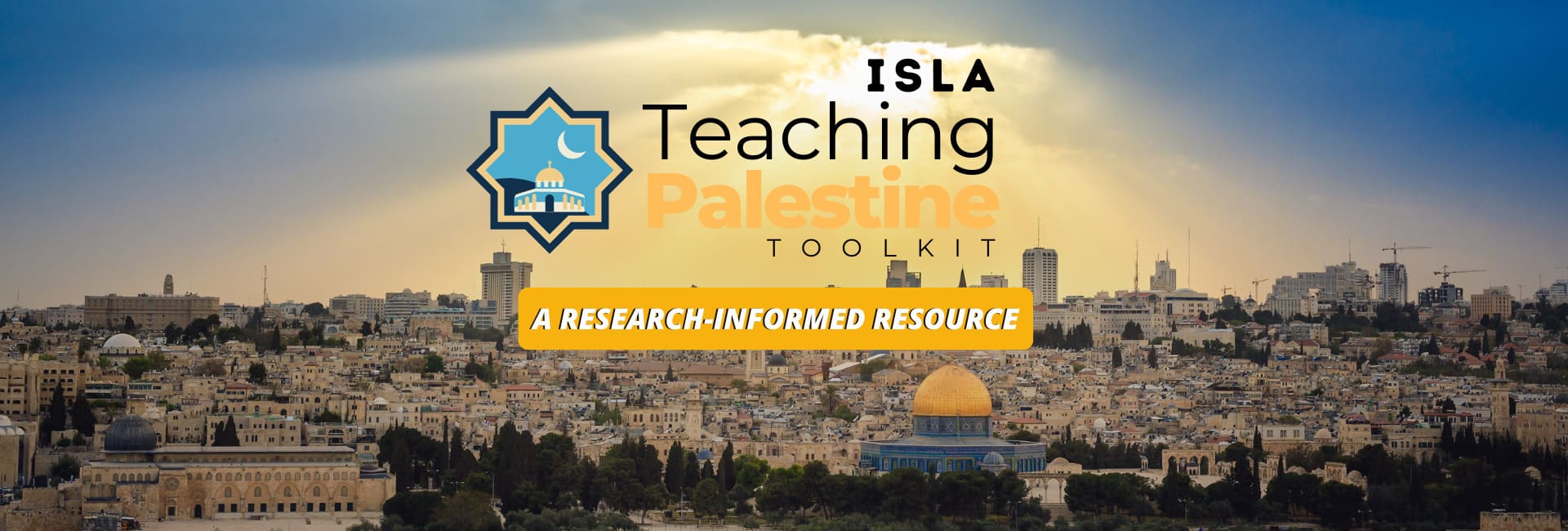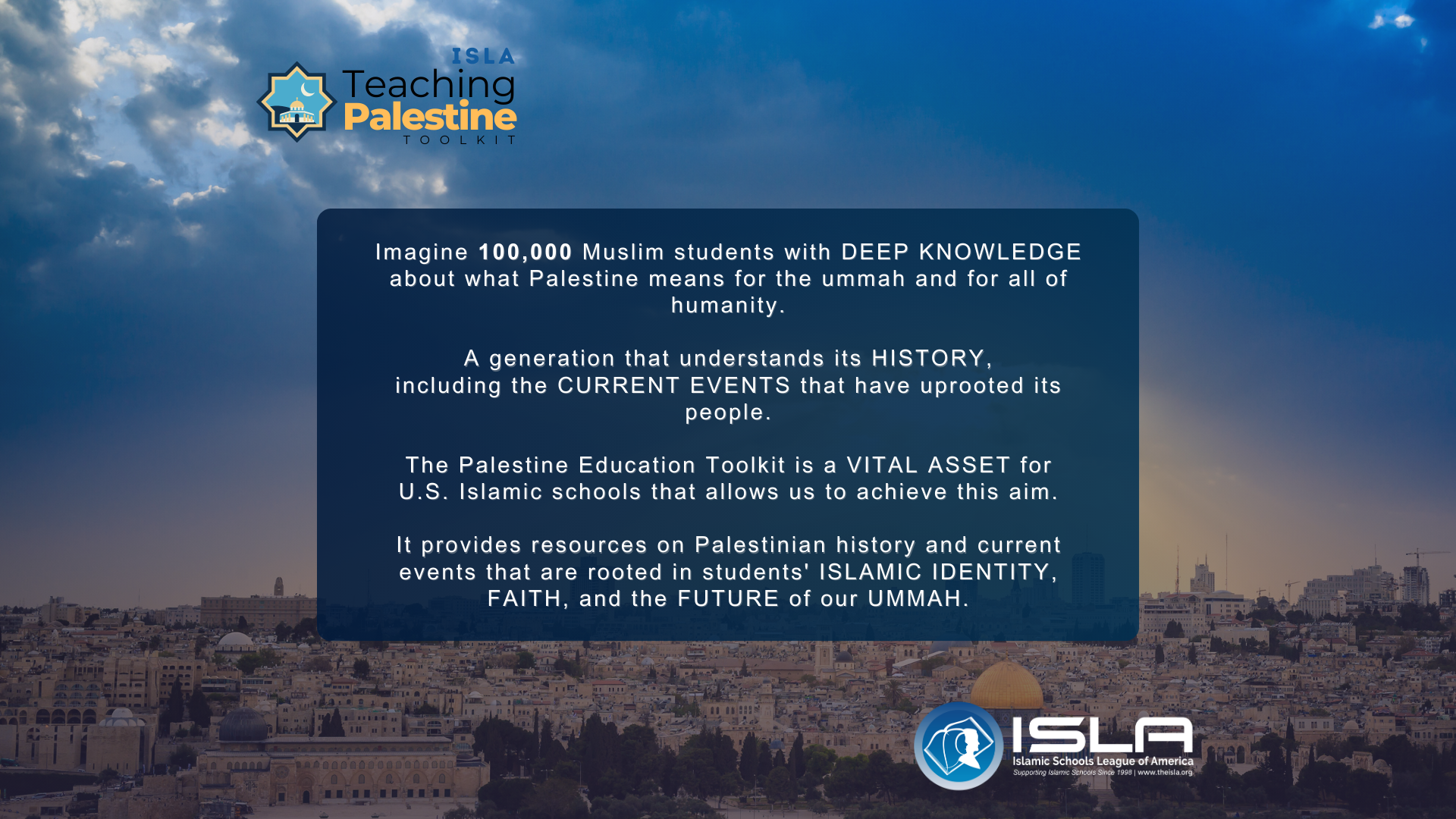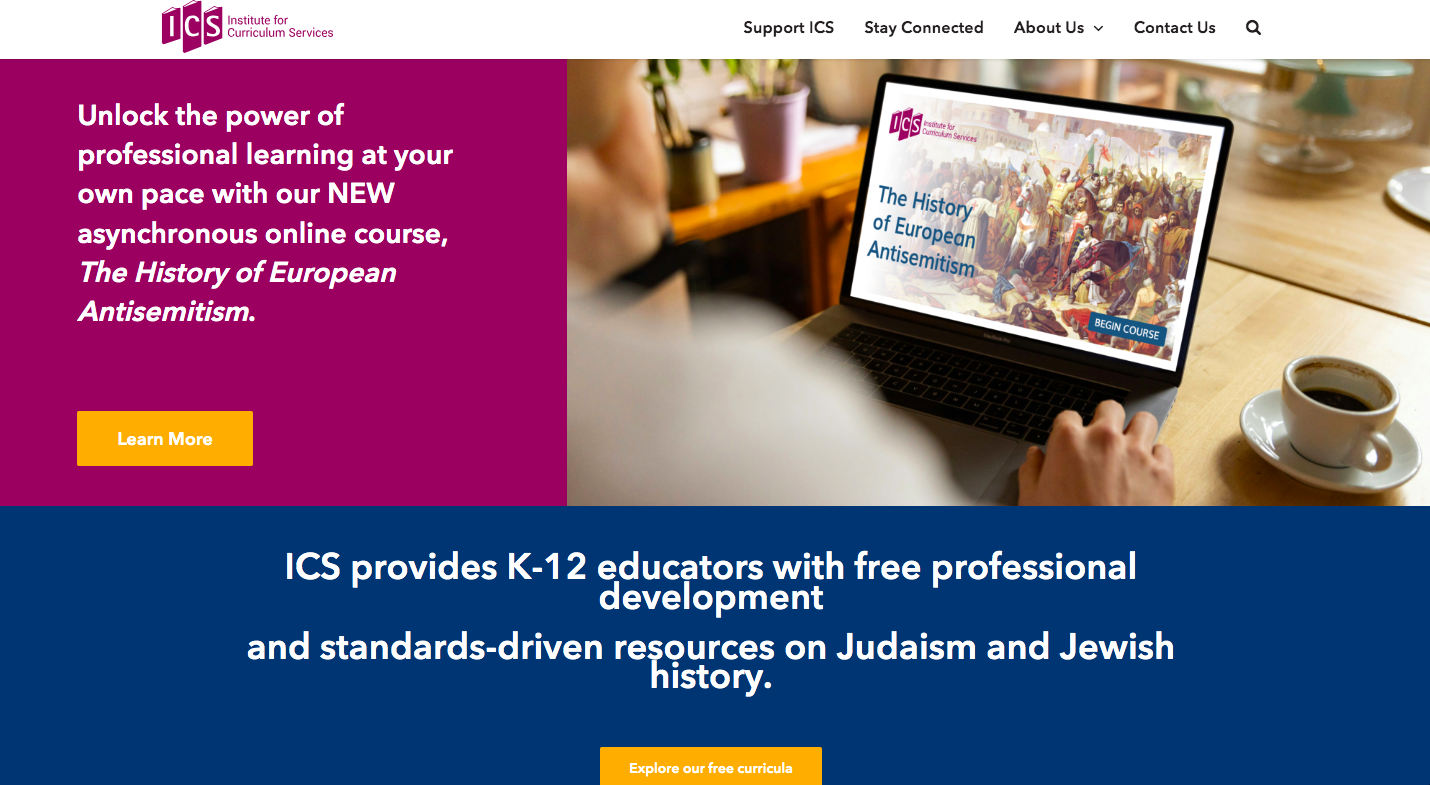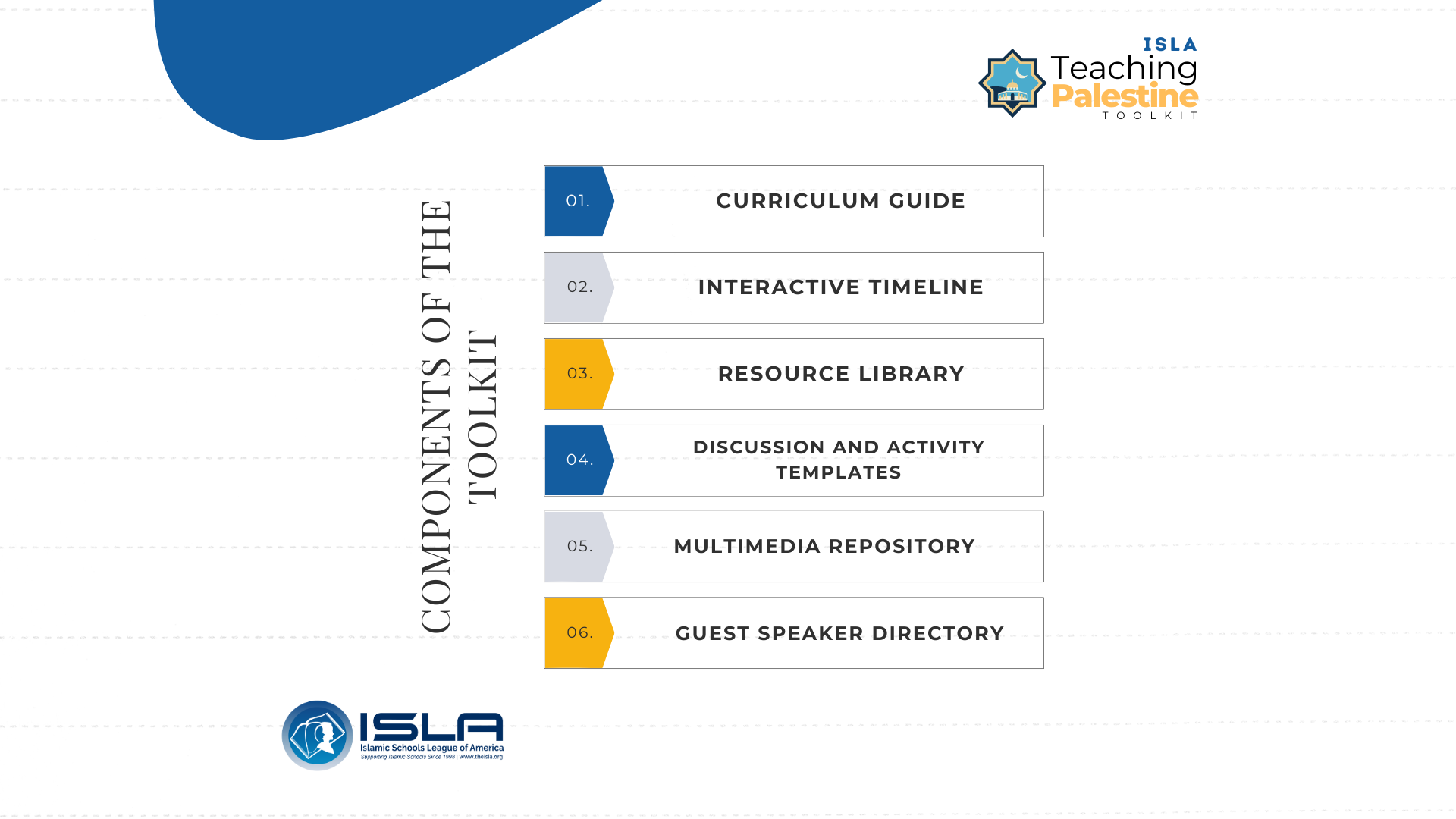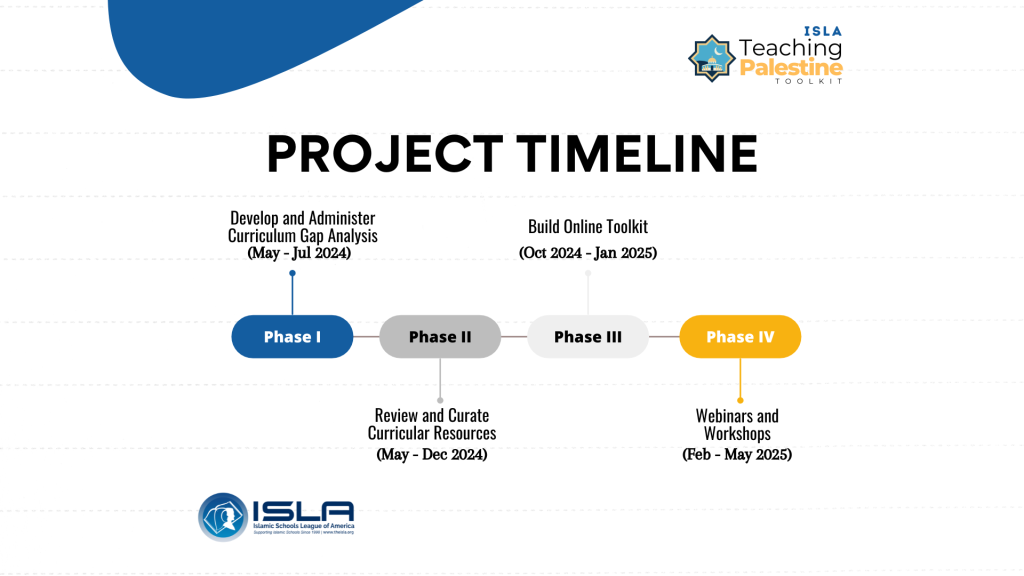Teaching Palestine Toolkit
The Vision:
The ISLA Teaching Palestine Toolkit not only elevates the educational journey of Muslim students, but also plays a crucial role in nurturing a future generation that is both well-informed and compassionate, rooted in a strong sense of their Islamic identity and its connection to both local and global struggles for justice.
Help Us Build The Toolkit
The Problem: Biased Content
From the media to school curriculum, there is a preponderance of content about Palestine that is simply inaccurate and misleading. Worse, it is all very easily accessible and presented as factual and credible.
In U.S. schools, organizations like Institute for Curriculum Services (ICS) produce free educational materials about Israel and the Middle East. They then provide free professional development to U.S. public school teachers to expand the use and impact of their curriculum. Their curriculum is promoted by top officials to public schools for use in their classrooms.
But there’s a problem. These materials include inaccuracies and omissions of important historical events, like the Nakba or the Great March of Return. Students in turn receive biased information about the history and current conflict in Palestine.
While Islamic school educators may wish to teach about Palestine, reputable resources are difficult to locate, or they are simply lacking. Teachers may inadvertently use these sources, unaware of their inaccuracies and biases. Students may in turn adopt the colonial narratives versus learning about it from a holistic perspective that centers indigenous voices.
The Solution: Teaching Palestine Toolkit
We need educational materials that our teachers can use to teach about Palestine that are rooted in Islamic values and historical truths. The Teaching Palestine Toolkit will be a research-informed, multimedia online toolkit that educators can access for free to teach about Palestine in their classrooms.
Help Us Build The Toolkit
Toolkit Components
Curriculum Guide
- Detailed lesson plans covering key historical periods and events.
- Suggestions for age-appropriate content aligned with Common Core Standards.
- Assessment Tools: Quizzes, essay prompts, and project ideas for student assessment. Rubrics for evaluating student understanding and engagement.
Interactive Timeline
- A visual, interactive timeline of Palestine’s history, from ancient times to the present day.
- Key events, figures, and turning points highlighted with additional resources.
Resource Library
- Sections divided by historical periods, topics, and current affairs.
- Inclusion of both Palestinian and international perspectives.
- Curated collection of books, articles, documentaries, and websites. Information packets on Palestinian culture, art, literature, and societal norms.
Discussion and Activity Templates
- Templates for classroom discussions, debates, and group activities.
- Guidelines for discussing sensitive topics and current events.
- Activities to engage students with real-life issues.
Multimedia Repository
- A collection of videos, documentaries, interviews, and virtual tours.
- Visual aids, maps, and infographics for classroom use.
Guest Speaker Directory
- Organize contact lists of experts, academics, community leaders willing to speak with schools about Palestine.
Toolkit Objectives
- Address the Urgency:
We are dedicated to providing educational resources about Palestine that are not only factual and unbiased but also rooted in Islamic teachings and worldview, addressing the urgent need in light of ongoing crisis and widespread misrepresentations in mainstream media and textbooks. - Fill Educational Gaps:
We will conduct a gap analysis to identify deficiencies in current educational materials about Palestine. Our toolkit will be crafted to fill these gaps and meet the real educational needs of our students. - Empower Through Education:
We aim to empower educators and students with accurate and comprehensive information about Palestine’s history and current issues, moving beyond limited colonial narratives and fostering a holistic understanding rooted in our faith. - Utilize Our Network and Expertise:
We will leverage ISLA’s extensive professional network, connecting with over 1000 educators and 300+ Islamic schools across the U.S. to ensure the toolkit’s wide reach. Collaborating with experts in Islamic education and Middle Eastern studies, we will ensure the content is both accurate and relevant.
What Makes ISLA’s Teaching Palestine Toolkit Unique
- Data-Informed – The project will begin with research– a needs assessment that helps ISLA identify what Islamic school educators are currently using to teach about Palestine and to identify gaps in their curricular resources.
- Educator Engagement- ISLA will be engaging educators in all stages of the toolkit creation.
- Vetted- Experts in curriculum and Middle Eastern studies will be utilized to ensure the accuracy and relevance of the toolkit.
- Standards-Aligned Educational Materials– ISLA will curate, review and align reputable resources with K-12 standards so that educators can implement them into the scope and sequence of their curriculum.
- Teacher Training – ISLA will host online and in person training to at least 200 teachers to ensure the toolkit is used in an effective manner
Project Timeline: May 2024- May 2025
Phase I: May – July 2024. Develop and Administer Gap Analysis
ISLA will survey K-12 American full-time Islamic school educators to understand their educational and pedagogical needs for teaching about Palestine.
Goal: 100 responses from teachers in diverse Islamic schools through targeted and snowball sampling techniques.
Phase II: May – December 2024. Review and Curate Educational Resources.
Based on a systematic review of extant English-language educational materials, ISLA will curate educational resources that address the needs identified in the gap analysis. ISLA will align the resources with U.S. national Common Core Standards.
Goal per grade level: Minimum of 5 lesson plans, 2 videos and 3-5 recommended pieces of literature.
Phase III: October 2024- January 2025. Develop Teaching Palestine Toolkit.
Work with web developers to create a user-friendly interface for the curated educational resources.
Goal: 1000 unique visitors to the webpage/toolkit in the first month of deployment.
Phase IV: February-May 2025. Webinars and Workshops.
Provide training to teachers on the educational resources, highlighting what makes it unique and how it can be implemented within the current curriculum.
Goal: Promote toolkit with targeted training online and in person to at least 200 teachers in total.
Outcomes
The Teaching Palestine Toolkit will have three distinct project outcomes.
- Report and Infographic on the curriculum gap analysis. ISLA will publish a full report on the findings of the gap analysis, similar to the ISLA Profile of Islamic School Principals’ Report, and will also include an infographic, similar to the Crisis Response Toolkit infographic.
- Curated Education Toolkit. The Teaching Palestine Toolkit will be a user-friendly page on the ISLA’s website that includes free, downloadable lesson plans, links to educational videos, and recommended reading lists, the other listed educational resources.
- Teacher Training Webinars & Workshops. At least two online teacher training webinars and two in-person sessions will be provided to familiarize Islamic school educators with the toolkit materials and help them understand trauma-informed, grade-appropriate methods for teaching these materials.. Through these webinars and workshops, we hope to train a total of 200 teachers.

